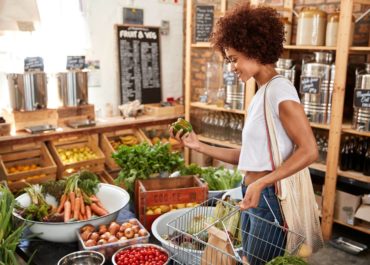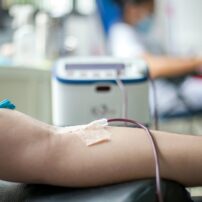 In our grab-and-go culture, plastic is pervasive at the grocery store. But as more supermarkets worldwide adopt smart strategies for reducing single-use plastic packaging, experts say that these same changes are possible here in the United States, so long as retailers, companies and individuals commit to making them a reality.
In our grab-and-go culture, plastic is pervasive at the grocery store. But as more supermarkets worldwide adopt smart strategies for reducing single-use plastic packaging, experts say that these same changes are possible here in the United States, so long as retailers, companies and individuals commit to making them a reality.
“It’s time to build smarter supermarkets,” says Kate Melges, plastics campaigner at Greenpeace. “We’re starting to see examples of retailers moving away from throwaway packaging, but not at the urgency and scale needed to address this crisis.”
A new report from Greenpeace, “The Smart Supermarket,” travels through a hypothetical grocery store to explore how single-use packaging-free initiatives can be implemented in every aisle, as well as details the benefits each change would have on consumers and retailers.
As you head into a new year and possibly resolve to reduce your environmental impact, consider these report insights:
“Nude” food: Plastic-wrapped produce creates needless packaging waste and potentially leads to wasted food, as consumers are required to buy portion sizes they may not need. “Nude” food lets you buy exactly what you need. For those products that do require packaging, stores and consumers should consider natural alternatives, such as banana leaves tied with bamboo twine.
Bulk staples: Smart dispensing systems for such shelf-stable foods as rice, beans and lentils allow customers to buy the quantities they need and can afford. And when customers dispense products into reusable containers they’ve brought from home or are supplied by the store, the system can eliminate single-use packaging.
Refillable personal and home products: While the public is becoming aware of the need for reusable shopping bags and coffee cups, there’s less awareness about alternatives to single-use plastics for beauty and cleaning supplies. Refill stations on favorite shampoos, dish soaps and more can substantially reduce plastic waste.
Smarter takeout: Many grocery stores have to-go options like salad bars and hot-food counters. At a smart supermarket, takeout will not mean throwaway. Technology is at the heart of the concept, with customers using an app to collect rewards when they return reusable cups and containers. This is great for stores who want to establish brand loyalty, and great for customers who want kickbacks and to reduce their plastic use.
Sustainable checkout: Five trillion single-use plastic bags will be used this year alone — that is 160,000 bags per second. Providing durable, reusable bags at checkout through a rent-a-bag scheme is an easy way for stores to reverse this trend.
Mindful online shopping: Buy your groceries online? A number of online retailers are already dropping off and collecting reusable containers via more sustainable transport. A smart supermarket can follow the same model.
Without decisive action, plastic production is set to quadruple by 2050. This new year, advocates say that everyone can resolve to do their part to stem the tide, with retailers and consumer goods companies cooperating to create eco-friendly solutions, and consumers demanding these alternatives and opting for them when they become available.























